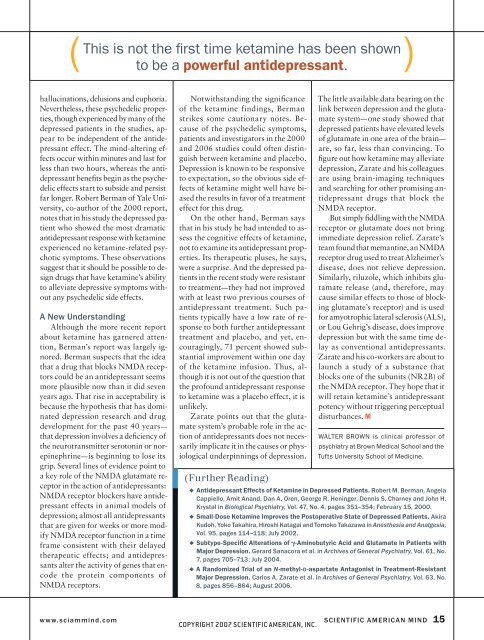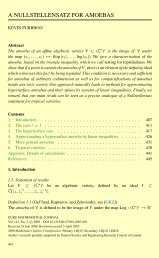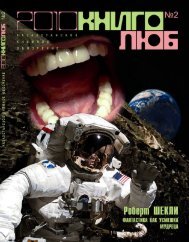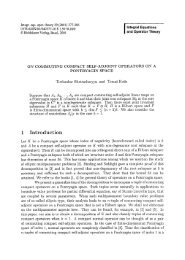Scientific American Mind-June/July 2007
Scientific American Mind-June/July 2007
Scientific American Mind-June/July 2007
You also want an ePaper? Increase the reach of your titles
YUMPU automatically turns print PDFs into web optimized ePapers that Google loves.
( This is not the fi rst time ketamine has been shown )<br />
to be a powerful antidepressant.<br />
hallucinations, delusions and euphoria.<br />
Nevertheless, these psychedelic properties,<br />
though experienced by many of the<br />
depressed patients in the studies, appear<br />
to be independent of the antidepressant<br />
effect. The mind-altering effects<br />
occur within minutes and last for<br />
less than two hours, whereas the antidepressant<br />
benefi ts begin as the psychedelic<br />
effects start to subside and persist<br />
far longer. Robert Berman of Yale University,<br />
co-author of the 2000 report,<br />
notes that in his study the depressed patient<br />
who showed the most dramatic<br />
antidepressant response with ketamine<br />
experienced no ketamine-related psychotic<br />
symptoms. These observations<br />
suggest that it should be possible to design<br />
drugs that have ketamine’s ability<br />
to alleviate depressive symptoms without<br />
any psychedelic side effects.<br />
A New Understanding<br />
Although the more recent report<br />
about ketamine has garnered attention,<br />
Berman’s report was largely ignored.<br />
Berman suspects that the idea<br />
that a drug that blocks NMDA receptors<br />
could be an antidepressant seems<br />
more plausible now than it did seven<br />
years ago. That rise in acceptability is<br />
because the hypothesis that has dominated<br />
depression research and drug<br />
development for the past 40 years—<br />
that depression involves a defi ciency of<br />
the neurotransmitter serotonin or norepinephrine—is<br />
beginning to lose its<br />
grip. Several lines of evidence point to<br />
a key role of the NMDA glutamate receptor<br />
in the action of antidepressants:<br />
NMDA receptor blockers have antidepressant<br />
effects in animal models of<br />
depression; almost all antidepressants<br />
that are given for weeks or more modify<br />
NMDA receptor function in a time<br />
frame consistent with their delayed<br />
therapeutic effects; and antidepressants<br />
alter the activity of genes that encode<br />
the protein components of<br />
NMDA receptors.<br />
Notwithstanding the signifi cance<br />
of the ketamine findings, Berman<br />
strikes some cautionary notes. Because<br />
of the psychedelic symptoms,<br />
patients and investigators in the 2000<br />
and 2006 studies could often distinguish<br />
between ketamine and placebo.<br />
Depression is known to be responsive<br />
to expectation, so the obvious side effects<br />
of ketamine might well have biased<br />
the results in favor of a treatment<br />
effect for this drug.<br />
On the other hand, Berman says<br />
that in his study he had intended to assess<br />
the cognitive effects of ketamine,<br />
not to examine its antidepressant properties.<br />
Its therapeutic pluses, he says,<br />
were a surprise. And the depressed patients<br />
in the recent study were resistant<br />
to treatment—they had not improved<br />
with at least two previous courses of<br />
antidepressant treatment. Such patients<br />
typically have a low rate of response<br />
to both further antidepressant<br />
treatment and placebo, and yet, encouragingly,<br />
71 percent showed substantial<br />
improvement with in one day<br />
of the ketamine infusion. Thus, although<br />
it is not out of the ques tion that<br />
the profound antidepressant response<br />
to ketamine was a placebo effect, it is<br />
unlikely.<br />
Zarate points out that the glutamate<br />
system’s probable role in the action<br />
of antidepressants does not necessarily<br />
implicate it in the causes or physiological<br />
underpinnings of depression.<br />
(Further Reading)<br />
The little available data bearing on the<br />
link between depression and the glutamate<br />
system—one study showed that<br />
depressed patients have elevated levels<br />
of glutamate in one area of the brain—<br />
are, so far, less than convincing. To<br />
fi gure out how ketamine may alleviate<br />
depression, Zarate and his colleagues<br />
are using brain-imaging techniques<br />
and searching for other promising antidepressant<br />
drugs that block the<br />
NMDA receptor.<br />
But simply fi ddling with the NMDA<br />
receptor or glutamate does not bring<br />
immediate depression relief. Zarate’s<br />
team found that memantine, an NMDA<br />
receptor drug used to treat Alzheimer’s<br />
disease, does not relieve depression.<br />
Similarly, riluzole, which inhibits glutamate<br />
release (and, therefore, may<br />
cause similar effects to those of blocking<br />
glutamate’s receptor) and is used<br />
for amyotrophic lateral sclerosis (ALS),<br />
or Lou Gehrig’s disease, does improve<br />
depression but with the same time delay<br />
as conventional antidepressants.<br />
Zarate and his co-workers are about to<br />
launch a study of a substance that<br />
blocks one of the subunits (NR2B) of<br />
the NMDA receptor. They hope that it<br />
will retain ketamine’s antidepressant<br />
potency without triggering perceptual<br />
disturbances. M<br />
WALTER BROWN is clinical professor of<br />
psychiatry at Brown Medical School and the<br />
Tufts University School of Medicine.<br />
◆ Antidepressant Effects of Ketamine in Depressed Patients. Robert M. Berman, Angela<br />
Cappiello, Amit Anand, Dan A. Oren, George R. Heninger, Dennis S. Charney and John H.<br />
Krystal in Biological Psychiatry, Vol. 47, No. 4, pages 351–354; February 15, 2000.<br />
◆ Small-Dose Ketamine Improves the Postoperative State of Depressed Patients. Akira<br />
Kudoh, Yoko Takahira, Hiroshi Katagai and Tomoko Takazawa in Anesthesia and Analgesia,<br />
Vol. 95, pages 114–118; <strong>July</strong> 2002.<br />
◆ Subtype-Specifi c Alterations of -Aminobutyric Acid and Glutamate in Patients with<br />
Major Depression. Gerard Sanacora et al. in Archives of General Psychiatry, Vol. 61, No.<br />
7, pages 705–713; <strong>July</strong> 2004.<br />
◆ A Randomized Trial of an N-methyl-D-aspartate Antagonist in Treatment-Resistant<br />
Major Depression. Carlos A. Zarate et al. in Archives of General Psychiatry, Vol. 63, No.<br />
8, pages 856–864; August 2006.<br />
www.sciammind.com SCIENTIFIC AMERICAN MIND 15<br />
COPYRIGHT <strong>2007</strong> SCIENTIFIC AMERICAN, INC.

















